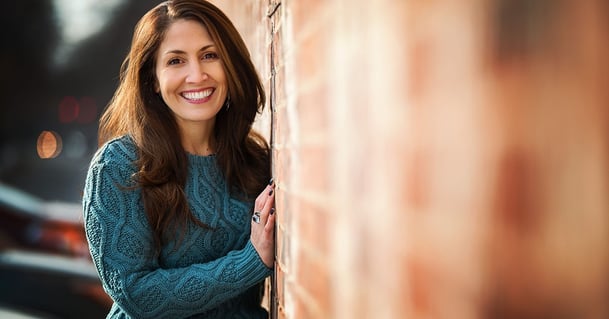
Have you ever felt hopeless and powerless in the face of your anxiety? Have you ever found yourself wishing that you could just feel better for good ... while simultaneously believing that recovering from anxiety isn’t a possibility?
If so, you won’t want to miss this exclusive interview with Jodi Aman of Anxiety-Free Me.
Anxiety and Addiction: How They’re Linked
First, let’s talk about how anxiety is an underlying core issue that can lead to addiction. In our experience, there is a significant overlap between anxiety and addiction, as well as depression and addiction. These conditions are companions in the world of dual diagnosis.
The connection between anxiety and addiction goes like this:
- You experience deep inner conflict as your feelings fight with your socialized beliefs.
- Your emotions ping-pong against the internal rules you've set up for yourself, and you experience anxiety as an emotional bouncing back-and-forth.
For example, you feel angry and you tell yourself, “You shouldn’t feel that way, that’s bad”; or you feel sad and you tell yourself, “You should just get over it already!”
Then as this push-and-pull continues, you feel increasingly unsettled and ungrounded. If any additional stress strikes, you might shift into panic.
By this point you feel so bad that to reach for an drugs or alcohol to help you manage what’s going on inside of you. But in the end, the original issue remains … and now, it’s compounded by substance abuse.
How can you break the addictive cycle? By learning how to heal from the conditions driving your depression and anxiety.
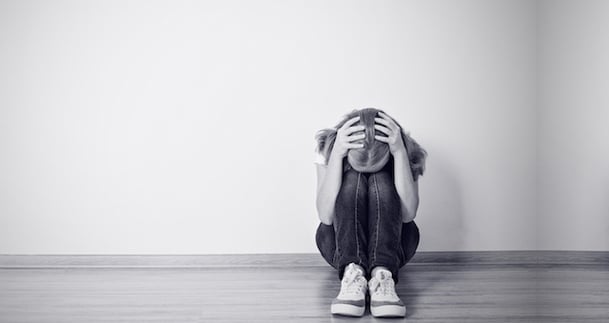
About Jodi Aman
Today we’re pleased to share our conversation with Jodi Aman. She’s been a psychotherapist for 20 years, and she has dedicated her life to helping people feel better.
She’s also a speaker and the author of the recently published book, You 1 Anxiety 0: Winning Your Life Back from Anxiety and Panic.
Jodi has a particular focus on calming anxiety and panic, helping people overcome their fears to live the life they want to live.
Anxiety Recovery with Jodi Aman
In our recent interview with Jodi Aman, we covered …
- What it’s like to struggle with anxiety and panic attacks from an early age
- The definitions of depression and anxiety, and the underlying core issues that fuel them
- The relationship between depression, anxiety, and addiction
- The power of the problematic stories we tell ourselves and how we can rewrite them
- How setting healthy boundaries can help alleviate anxiety
- Breaking free from unrealistically high self-expectations
- Demystifying self-love and a practical technique you can use today
We’re so glad that Jodi took the time to connect and share her insights with us.
Caroline: Jodi, on your website you write about how you struggled with panic attacks and family chaos from a young age. Could you share that part of your story with us?
Jodi Aman: Yes, I'd love to share that part of my story with you. When there's some insecurity at home, a lot of times a child doesn't develop security or self-confidence. You never know what's going to happen, right? When you never know what's going to happen, things feel a bit out of control.
This could turn into anxiety.
For me, I started having anxiety and panic when I was five years old. I started struggling with being alone, with getting distracted. I was always thinking about death, decay, ghosts. I was terrified that I might lose someone I love. I realized that if I thought I had any security at all, I really didn't, because I could lose it so easily. I really never had it in the first place.
"I struggled for 20 years with my anxiety, up and down."
It wasn't horrible for all of those 20 years, it came and went. It felt like the anxiety gave me a break sometimes and then came back. I was always running away from it.
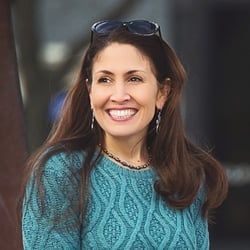 When I was in my twenties, I had another bout, a horrible episode, probably the worst in my life if you don't count when I was young, since I'm sure that was just as bad.
When I was in my twenties, I had another bout, a horrible episode, probably the worst in my life if you don't count when I was young, since I'm sure that was just as bad.
I had this bout with anxiety for a couple of months, and I just couldn't go to work sometimes, couldn't get out of bed.
I was already a social worker in a psychiatric center. My colleagues we're sharing their hard cases. I was sitting there in this meeting, week after week, thinking, "I'm worse. My anxiety is worse than their hardest cases, and I'm supposed to be the one helping everybody."
I started to panic. The humiliation took over and I had to get out of that room. I backed out of the room, ran to the stairwell, bolted down the stairs, and got into my car.
I looked at myself in the rear view mirror to pull out of the parking space, and I noticed that I had the same face as my dad had when he talked about death. When I first learned about death from him, he was pale and his neck was really long, and I was the same.
I took a breath and sat in the car and looked at myself again. I thought,
"You know what, if I could learn this, I could unlearn it."
It was in that moment that I realized I learned the anxiety. I learned to be afraid of it. I learned to be afraid of loss and insecurity and death and all that.
I set my sights on figuring it out, learning how to get better. I just never looked back. It took me a while because I had to figure it out from scratch, but now I've put it together for people.
I wrote this book, You 1, Anxiety 0. I have programs online. I do different things to get this message out there, because there are so many people suffering with anxiety.
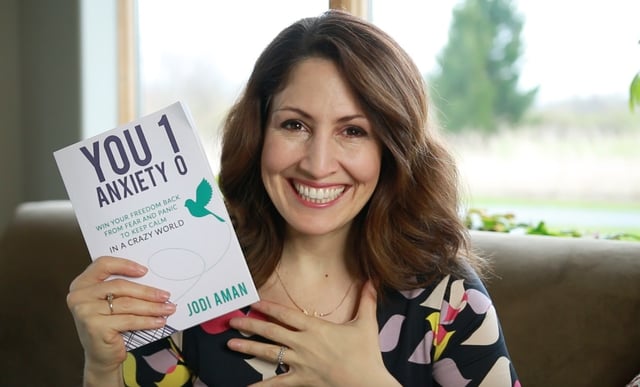
The suffering is intense, we know that. If you've experienced it, you know.
Defining Anxiety and Depression
Caroline: In our Program we define depression as anger turned inward. Similarly, we describe the link between anxiety and addiction as the feeling of bouncing back and forth between internal emotional barriers, places in which you’ve blocked off your real feelings.
What were some of the underlying core issues that contributed to your experience of depression and anxiety?
Jodi Aman: I was also really depressed a lot when I was young. I think that's why I went into social work, because I was so depressed and lonely, and I realized that people just needed someone to walk with them.
Occasionally I took that role with other people who were sad. You know, misery loves company, they kind of seek out each other. When other depressed people came and sought me out, and I helped them, I felt better.
I think that's why I went into the helping profession, because I realized that I could heal with these connections to other people. I could help them. I understood them. That's what brought me here.
There was definitely anger ... anxiety brings up a lot of anger. Often we turn it into ourselves, we blame ourselves. Yes, it does turn into depression; there’s such a connection.
I define anxiety as the leftover fear response when you're not in physical danger. You're not in physical danger, but still you keep pumping it out.
If you were in physical danger, you'd take action to get yourself to survival. You'll use that adrenaline to take that action, so you wouldn't be lost in anxiety. When that adrenaline gets released and there's nothing to do because you're safe physically, then it just keeps perpetuating.
Your rational mind thinks, "I'm not in danger," but it feels dangerous. It feels so awful. It feels so scary. So your body keeps pumping those hormones out, and that's anxiety.
One underlying core issue that contributed to my experience with depression and anxiety was self-blame and negative self judgment. That’s one of the biggest reasons why we struggle from depression and anxiety.
When we negatively judge ourselves - and in this culture, we do! - we have these expectations that we have to live up to that there's no way we can. They're totally unrealistic.
We always feel inadequate: not good enough, not smart enough, not pretty enough, not young enough, not happy enough, whatever.
We're always going to be in deficit because our expectations of ourselves are too high. We think we need those expectations because we don't want to feel left out. We don't want to be excluded, we want to belong. That's why this phenomenon happens.
We judge ourselves so harshly, and that's what ultimately leads to anxiety and depression.
When we judge ourselves, we don't trust ourselves. When we don't trust ourselves, we don't trust yourself to handle anything, make decisions, get out there.
Anxiety can absolutely convince you of its lies, the lies that say you can't handle it.
The Relationship Between Depression, Anxiety, and Addiction
Caroline: How do you envision the relationship between depression, anxiety and addiction?
Jodi Aman: Great question. There’s negative self judgment and the pain that comes with that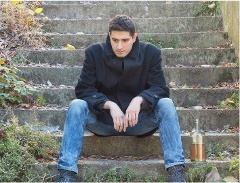 , and then the fear and the pain that comes with the fear, and then the suffering that comes with the fear. It does make somebody desperate to do something to stop those feelings.
, and then the fear and the pain that comes with the fear, and then the suffering that comes with the fear. It does make somebody desperate to do something to stop those feelings.
That leads a lot of people down the road of addiction. They need to self-medicate because it feels so bad.
The guilt and the fear are such powerful ways that we suffer … so we reach for something in our desperation to stop feeling so bad.
That's where addiction comes from.
We have these feelings, totally appropriate human feelings, like loss, but then right away we start judging it. "How long am I going to feel this way? Why am I overreacting? What's going on? How am I going to do this?"
Then we have all this fear. "How am I going to handle this? Is this going to last forever? What am I going to do?" You have the pain, but then right away you have that angst - which I'm calling guilt and fear here - that compound everything.
The Power of Problematic Stories We Tell Ourselves
Caroline: In your work you talk about the power of the stories that we tell ourselves in our own minds, the way we interpret the events of our lives.
What are some of the most common negative and problematic stories we tell ourselves, and how can we begin to rewrite them?
Jodi Aman: I'm a narrative therapist, so I love this question. We often have dominant stories that are problems in our life. We're a loser, we mess everything up. We don't do anything right. Everything bad happens to us. It could be a victim's story. It could be an, "I'm crazy" story. It could be an, "I'm anxious" or "I'm weak" story, or, "Nobody loves me."
We tell ourselves these things in our mind, and we perform in those stories. Everything we see, we filter through those stories to make meaning. It’s how we think about ourselves. Everything we’ve done, our very identities, are viewed through these stories.
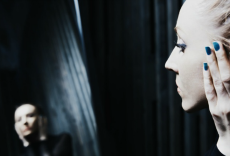 Because the stories are so powerful, they’re the basis for how we interpret everything else.
Because the stories are so powerful, they’re the basis for how we interpret everything else.
If someone doesn't call you back, it's because you're a loser. You forget that they might have been in the shower when you called, or whatever.
You think about only one conclusion, because that goes along with your story. That's a very simple way to see it.
Often we tell stories where there's no wiggle room. It's a definition of who we are, like an absolute truth. But it's just limited. One common example might be, "I'm a loser."
That's problematic because there's no variability. There's nowhere to go. There's no way to grow and come out of it. It's saying that you're this forever. It's definitive. That's what makes it so problematic.
Any of these negative words - if they're in the definitive - are problematic in that way. We pick all different ones, but they're all based in fear and guilt. It's a negative against yourself.
I helped people for 20 years: 35 people a week, about two to three problems an hour. I did the math one time. It's 105,000 problems that I helped people unpack.
Behind each and every one of them was fear and guilt.
Really the biggest fear we have is that we're not good enough, and that's guilt.
At the very basis, those two are the exact same thing also. There's a commonality inside; we just use different words.
How could we begin to rewrite them?
There are always other storylines. But because the problem story is so big and huge, it's hard for us to have access into those other stories. It's hard for us to see them.
What we want to do is in therapeutic conversations (or even in journaling), is to look at those other storylines, such as,
“You're a loyal friend; your kindness and your interest in connecting with other people.”
Then we need to breathe life into those other stories, to talk about them a little bit more and look for evidence of them. We need to start to read the new events in our life through those new stories, and then start to create new identities with them.
Anxiety Affects Us Physically, Mentally, Emotionally, and Spiritually
Caroline: How does your journey with anxiety inform your work today?
Jodi Aman: I help people every day. Since my book came out, most of my new clients are coming to me with anxiety. I lead them through the steps and they feel better.
I think I give hope to people and let people know it's possible. I teach them real skills. I am a very practical teacher, and that's really helpful to people. There's a lot of esoteric teachers out there, and people don't know what to make of that stuff.
Caroline: In addition to being a psychotherapist, you're also serve as a yoga teacher, shamanic healer, a real practitioner apprentice. Can you speak to importance of holistic healing?
Jodi Aman: Absolutely.
Anxiety affects us physically, mentally, emotionally, and spiritually.
When I'm giving these practical tips, and how to get over it, I am telling people exactly how it helps them physically, mentally, emotionally, and spiritually, so they can see the benefits.
For example, take creativity. It literally helps the cortex develop better, and be better against anxiety. That's a physical change.
Then mentally … well, anxiety is a distraction, right? And creativity helps with focus.
Emotionally, it’s going to build self-esteem up because you're going to see progress if you're doing something creative.
Spiritually, it gives you a bit of a purpose to your life. There's all those benefits of doing something creative, and I think that's really important for people to see that connection.
We hold our issues in our tissues. We do hold our anxieties, and our fears, and the things from our past in our tissues in our bodies. When we change our beliefs, they get released from our physical tissues also. It's awesome.
How Setting Healthy Boundaries Helps Alleviate Anxiety
Caroline: Could you tell us a bit about why setting healthy personal boundaries is so essential when it comes to alleviating anxiety?
Jodi Aman: There's a safety to it. It feels like you can get in control. When you set your own boundaries, then you trust yourself. It's about you building trust in yourself.
It doesn't matter what anyone else does.
It doesn't matter if anyone hurts you, because you can handle it.
That doesn't mean be open with everybody.
It means that you set your own boundaries so you're protected. Once you feel protected, your anxiety is not saying, "You’ve got to protect yourself. You got to protect yourself."
Anxiety wants to set these false protections that aren't really true. I'm trying to teach people to set real ones, so they feel secure. Then they trust themselves and then anxiety can't bother them.
Break Free From Unrealistic Self-Expectations
Caroline: Recently you did a video titled, “Are your high expectations killing you?” (Great title!) Could you share a bit about how our own expectations contribute to high anxiety levels, and how to adjust those expectations to be healthier and more realistic?
Jodi Aman: As I was saying in the beginning, we have these high expectations. We think everybody is judging us. We don't want to get judged as being wrong, or bad, or an outsider. We don't know what the high expectations are, so we have to be even more perfect to make sure we're in the right.
We don't want to be ostracized. We don't want to be left out. This is a huge part of all of our emotional problems, these these cultural expectations, these cultural discourses that you don't want to be outside of.
And when you don't like yourself very much, or you don't think you're good, you're not going to trust yourself.
The opposite of anxiety is trust. You need to trust yourself to get over anxiety. When you don't trust yourself, your anxiety goes through the roof.
You adjust those expectations by noticing them and realizing they're ridiculous. Realize that you have full control whether you need to meet them, or not.
When we're blind to them, when we just do it rote, it can drive us crazy. When we understand, and we see those expectations, we can make choices that bring them down a little bit. We can make them more realistic and more comfortable.
We can stop beating ourselves up and feel happier overall.
Demystifying Self-Love
Caroline: One of our Participants summed up our residential recovery Program in this way: “It’s really cool. We’re all learning how not to hate ourselves anymore.” So how fitting that you published a post and video titled, “De-mystifying self-love”. Could you take us through how to gain self-love if you’ve never had it?
Jodi Aman: I don't believe people never had it. If you watch the video, you'll see what I'm talking about. Even if people hate themselves, they also defend themselves, don't they?
The fact that they defend themselves at all … though sometimes that's not necessarily good, right?
They're defending their problems, so they're holding onto them. But they are, in a way, defending themselves.
And that tells you that they know somewhere that they're worthy, even though they're acting out a lot of other ways that they're unworthy. It's there somewhere.
First of all, pointing that out is important to the practitioners as well as to the clients. They have this self love, but people feel like they have to do something or feel something, like an energy burst.
But there's no feeling for self love, really.
It freaks people out when they close their eyes and say, "Okay let me see if I can feel self love," and they feel nothing. They're like, "Oh my God, I don't have it. I never did, blah blah blah."
Self love starts with self compassion.
We just judge ourselves way too much. That's why we're blind to the self love that we already have.
It's because we are constantly not liking ourselves.
That leads to self hatred, but that doesn't mean you don't have self love.
It means that you don't like yourself. You don't like any parts of yourself. But, that worth is still there because they're still defending themselves, no matter how much they hate themselves!
What you do is you have self compassion. People don't even know what this is or how to do it. All you do is just this: whatever you feel at all, you just say, "I understand. I get it."
When we don't do this, we think something like, "Why am I feeling that, what's wrong with me. I'm overreacting, uh-oh." Whatever you feel, just say to yourself, "I get it."
You have that self love for yourself. There's a validation there in you, and it deflates how upset you are. That is how you start to practice not judging yourself, staying away from that negative self judgment. And then self love can just come out and grow. It's there. It's just blocked by all of this terrible judgment.
To learn more anxiety and addiction, download our free eBook on Dual Diagnosis.
Download Dual Diagnosis Free EBook



